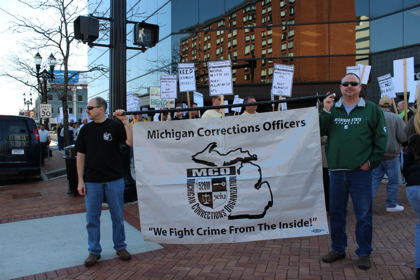By WEI YU
Capital News Service
LANSING – The Department of Corrections is looking at new technologies to reduce staffing costs without reducing security.
According to the department, 27 prisons will no longer have armed perimeter patrols 24 hours a day. It also will change the job classifications of some corrections officers in April as a cost-saving strategy.
However, union leaders say the move could endanger the public and staff.
Corrections Director Daniel Heyns said the changes will reduce the $2 billion Michigan spends annually on prisons, about one third of the state’s general budget.
“The primary criticism of the department was it costs too much,” Heyns said.

Members of the Michigan Corrections Organization picket in front of the Department of Corrections. Credit: Wei Yu/Capital News Service
“Some of the things we have done traditionally in Corrections are real expensive. One of them is those 24-hour patrols around the outside of facilities,” Heyns said. “I thought it needed to be evaluated and explored how can we do it differently and cheaper.”
He said reducing perimeter patrols could save between $13 and $15 million a year.
The director said the changes won’t make the prisons less secure. By looking at new technological solutions, the department can still achieve the necessary security.
“I am not going to do things that I think will jeopardize the safety of my staff or the public. Safety and security for the staff and inmates, and primarily the public, have always been the top priorities for me,” Heyns said.
The department has increased its use of technology such as stun fencing, motion sensors and lighting in recent years. According to the department, such advances have lessened the need to run perimeter vehicles all the time.
“In a lot of ways, technology gives us those tools and opportunities. If corrections doesn’t employ that benefit, then we will be left behind,” Heyns said.
However, members of the Michigan Corrections Organization, the union representing corrections officers, protested the changes outside Corrections Department headquarters a few blocks from the Capitol.
Among the protesters were officers from Macomb Correctional Facility in New Haven, Gus Harrison Correctional Facility in Adrian, Ryan Correctional Facility in Detroit, Oaks Correctional Facility in Eastlake and Pugsley Correctional Facility in Kinglsey.
“We are proposing that the Department of Corrections, as well as each of the facilities, sit down with our leadership officers to discover savings and efficiencies,” said Mel Grieshaber, the union’s executive director. “Let us be a part of the solution.”
Grieshaber said the department is unilaterally doing things that could jeopardize the safety of communities near the prisons. “Our concern is about the safety inside the prison, as well as the community on the outside.”
He said new technologies are not sufficient to replace human responses and availability to address any situation.
Sacha Crowley, a communications specialist for the union, agrees.
She noted that three convicted murderers at Kinross Correctional Facility in Kincheloe in July 2010 hijacked a delivery semi-truck and drove it through the fences, then fled on foot into the community.
It was a perimeter security vehicle driver who stopped them, fatally shooting one of them, Muskegon’s worst-ever mass murderer, Seth Privacky.
“Fences go down regularly from wind and other weather issues,” Crowley said. “The gun towers are no longer manned due to budget cuts, and if the perimeter patrols are cut, that means the department is removing another tool to keep the communities safe.
“The new system will take more time for an officer to suit up, obtain a weapon and respond. It is likely too late,” Crowley said.
Assistant Professor Steven Amey at Ferris State University said reducing 24-hour perimeter patrols would possibly have a dramatic effect on response time to any incident such as assaults on inmates, assaults on guards or potential escape attempts.
“Technology could be an operational level decision in an attempt to reduce costs since technology can assist in many areas. However, safety would be my utmost concern,” Amey said.
© 2012, Capital News Service, Michigan State University School of Journalism. Nonmembers cannot reproduce CNS articles without written permission.